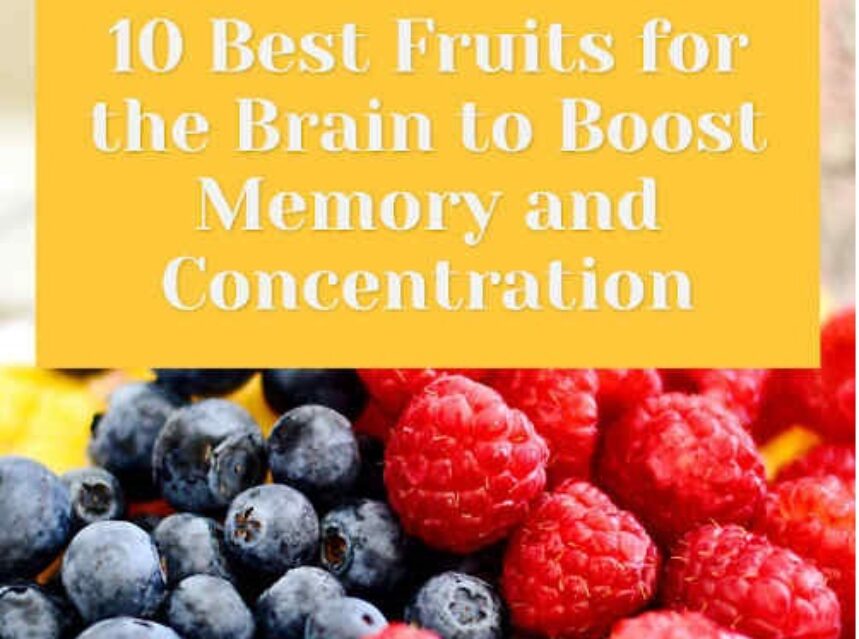10 Best Fruits for the Brain to Boost Memory and Concentration

Here’s the thing.
Your brain is the powerhouse that controls every single thing in your life.
Why?
Because it’s the one responsible for your every action, thinking, and feelings.
With the help of about 100 billion neurons transmitting signals across your brain, you’re capable of forming memories, thoughts, and feelings.
In fact, you won’t be able to read and digest every word I’ve written so far if it’s not because of your brain.
The brain is amazing, isn’t it?
It’s the boss of your heart, the one that keeps your lungs breathing, and the partner that helps you focus and concentrate.
That’s why maintaining your brain’s health is crucial.
And the best way to keep your brain healthy and boost your memory is by consuming brain healing foods.
While you may find plenty of brain food supplements in the market, nothing beats the goodness of whole foods.
Fortunately, there are many foods that improve memory and concentration you probably didn’t know about, which include super fruits that’ll serve as excellent brain foods snacks for kids and students when studying for exams.
In this post, you’ll learn 10 of the best fruits for brain health according to science.
Excited?
Read on if you want to find out more about the best food for brain growth that helps boost your memory, concentration, learning, and cognitive function.
- Brain fruit #1: Blueberries
- Brain fruit #2: Strawberry
- Brain fruit #3: Bilberry
- Brain fruit #4: Blackcurrant
- Brain fruit #5: Other berries
- Brain fruit #6: Oranges
- Brain fruit #7: Cherries
- Brain fruit #8: Plums
- Brain fruit #9: Avocados
- Brain fruit #10: Apples
- Other nutritious fruits for healthy brain
- Related Questions
- Like what you read? Pin this post to your favorite Pinterest board!
Brain fruit #1: Blueberries
When people talk about brain fruit, blueberries would usually come out at the top of the list.
In fact, Dr. Steven Pratt, the author of the best-selling book, “SuperFoods Rx: Fourteen Foods Proven to Change Your Life,” called these natural candy “brain berries.”
Blueberries give you a lot of health benefits, including promoting heart health, preventing cancer and aging, and improving your brain health.
A recent clinical study found that berry fruits, such as blueberries, can reduce the risk of age-related neurodegenerative disorders, such as dementia and Alzheimer’s disease.
Berry fruits can also enhance motor and cognitive functions.
But what exactly makes blueberry a superfruit for the brain?
Antioxidants.
Specifically, blueberries contain a high amount of flavonoids (polyphenolics) subclass called anthocyanins, which can pass through the blood-brain barrier and concentrate on the learning and memory area.
A study published in Neurobiology of Aging proved that antioxidants supplementation protects the brain from age-related oxidative stress.
Antioxidants contained in anthocyanins in blueberries are especially great at safeguarding your brain from stress and degeneration.
A study published in Free Radical Biology and Medicine also suggests that among the antioxidant sources, phytochemicals in berry fruits (which include anthocyanin and caffeic acid) play an advantageous role in brain aging and neurodegenerative diseases.
Their neuroprotective effects are mainly due to their anti-oxidative, anti-proliferative, anti-inflammatory, and antiviral functions.
Moreover, a summarized review published in the Current Opinion in Clinical Nutrition and Metabolic Care, antioxidant-packed berry fruits are found to be beneficial in improving learning and memory.
The positive cognitive effect may be due to the capability of berry polyphenols to directly communicate with aging neurons.
The improved interactions between brain cells help the neurons to properly carry out their function during aging.
Researchers also found that blueberry polyphenols, among others, can prevent aging and related brain disorders through increased neurogenesis in the brain of an adult.
Moreover, a preliminary study published in the Journal of Agriculture and Food Chemistry suggests that blueberry supplements help boost memory, especially amongst the elderly.
Animal studies have also shown that a diet rich in blueberries can considerably boost both motor skills and learning ability of aging rats, allowing the older rats to possess the same mental capability as that of younger rats. They may even delay short-term memory loss!
Brain fruit #2: Strawberry
Strawberries or scientifically known as Fragaria ananassa, are a native Mediterranean species that also grow in other regions of Eastern Europe.
Aside from containing rich amounts of antioxidants, strawberries are one of the best natural sources of vitamin C.
They are also rich in manganese and contain a decent amount of vitamin B9 and potassium.
Amongst the berries, strawberries are the most commonly consumed across the globe.
Similar to blueberries, strawberries are an excellent food for brain power that can keep your brain sharp as you grow older.
A recent study by the Harvard researchers from Brigham and Women’s Hospital, which was released in the Annals of Neurology, discovered that high consumption of berries, including strawberries, over time can help slow down memory deterioration in older women by 2 ½ years.
The Morris water maze performance has also shown that strawberry extracts can enhance cognitive capabilities.
An animal study published in the Journal of Neuroscience reported that maintaining rats for 2 months in antioxidant diets with strawberry extracts help prevent neurochemical and behavioral changes caused by aging.
The scholars also reported the enhancement of motor behavior, spatial learning, and memory of the rats.
Aside from their brain-boosting effect, studies have shown that strawberries provide plenty of other potential health benefits, which includes:
- Improve heart health and reduce the risk of death associated with heart diseases
- Regulates blood sugar
- Prevent certain cancer, such as oral cancer
- Enhance blood antioxidant status
- Reduce oxidative stress and inflammation
Brain fruit #3: Bilberry
Bilberries or scientifically known as Vaccinium myrtillus L. are originally found in Northern Europe, but today they can also be found in some parts of Asia and North America.
They are sometimes referred to as European blueberry, huckleberry, blueberry, and whortleberry.
Since bilberries look pretty much the same as the North American blueberries, they are often called blueberries.
Bilberries provide one of the richest natural sources of anthocyanins, which makes them rich in antioxidants and gives them the blue-black color.
They are also rich in vitamin C, E, and manganese, and contain carotenoids, zeaxanthin, and lutein. Each of these components provides significant health effects.
While bilberries are popularly known for their role in enhancing vision, studies have shown that bilberry can potentially promote brain health.
A study released in the Molecular Nutrition and Food Research suggests that bilberry and its anthocyanins have neuroprotective properties and preserve brain and retinal function.
Another study published in Nutrients reported that bilberry can enhance long-term and working memory in the elderly population.
Aside from neuroprotective and ocular effects, several studies have reported the potential health benefits of bilberry, including:
- Anti-obesity and lower blood sugar level
- Anti-inflammatory
- Lipid-mitigating effects
- Improve heart health
- Lower oxidative stress
- Anti-cancer
- Anti-microbial properties
Brain fruit #4: Blackcurrant
For more than half a century, blackcurrant was called the “forbidden fruit” and was banned in the United States.
The prohibition of this translucent pulp of green-red shades berry was because back then, people believed it helped spread a fungus (white pine blister rust) which harmed the timber industry.
Fortunately, a new variety of disease-resistant currants were introduced back in 1966 along with innovative methods to prevent the fungi.
Soon after, the government rleft it up to the states to legalize the fruit and in 2013, New York was amongst the earliest states to repeal the ban. Some states have also started to lift the ban.i
Nowadays, blackcurrants are grown by the farmers in the Northeast and Pacific Northwest of the United States and used to make foods, such as jams, jellies, oils, and teas.
Blackcurrants are a nutrient-dense fruit with plenty of health benefits.
Both red and black currants contain 4x more vitamin C than oranges and 2x more antioxidants than blueberries!
A recent study in the Journal of Nutritional Biochemistry listed blackcurrant as one of the powerful fruit that offers neuroprotection in Alzheimer’s disease.
In this study, the researchers also found that cells treated with anthocyanin-dense blackcurrant extracts considerably decreased the production of reactive oxygen species, which plays a major role in chronic disorders, including neurodegenerative diseases.
Another animal study in the Journal of Toxicology and Environmental Health demonstrated the protective effect of blackcurrant juice against oxidative stress formation in the brain, liver, and serum.
The potential of blackcurrant extracts in protecting brain neuronal cell damage has also been reported in the Journal of Food Nutrition Research.
Moreover, blackcurrants contain anti-inflammatory substances that decrease neuroinflammation and may lead to enhanced memory, learning, and cognitive capacity.
Aside from the potent antioxidant, anti-inflammatory, and anti-microbial properties demonstrated in modern laboratories, blackcurrants provide several research-proven and promising nutrition and health benefits, including:
- Rich in vitamins, including vitamins A, B-5, B-6, B-1, C and E.
- Traditional herbal medicine
- Boost immune system
- Reduce eye fatigue and improve visual function
- Relax contraction in gastrointestinal disorders
- Promote kidney health
Brain fruit #5: Other berries
Aside from the berries mentioned above, research shows that other types of berries also contain flavonoids, a type of plant chemicals which gives berries their brilliant colors and helps keep your brain sharp.
A well-written review by Dr. Miller and Shukitt-Hale from the human nutrition center of USDA suggested that the consumption of berries, including blackberries, strawberries, blueberries, and other berry fruits, has a positive impact on your brain.
Here are some other berry fruits that can boost your brainpower according to studies.
- Blackberries: Aside from being rich in antioxidants, blackberries are rich in vitamin C and K, dietary fibers, manganese, and folate. Just one cup or 144g of blackberries contains about 7.6 grams of fiber and have enough vitamin C to satisfy half of your recommended daily dose of vitamin C.
- Raspberries: Alongside flavonoids, raspberries contain plenty of other antioxidants, including vitamin C and E, beta-carotene, lycopene, lutein, zeaxanthin, and selenium.
- Mulberries: Apart from helping you to prevent ROS production and decrease the degree of neuronal damage, mulberries are used in traditional medicine as diuretics, antipyretic, anti-inflammatory, antitussive, and prevent high blood sugar.
- Cranberries: In addition to boosting neuronal function and restoring your brain’s power to produce a neuroprotective response to stress, studies showed that cranberries help treat UTIs, promote heart health, improve dental health, and slow down cancer progression.
Brain fruit #6: Oranges
You might be growing up recognizing oranges as a superfruit with plenty of vitamin C, right?
In fact, if you eat a medium orange, you can easily get your required daily dose of vitamin C.
But what can vitamin C do to your body anyways?
You might’ve heard the infamous roles of vitamin C in collagen formation, scurvy prevention, or iron absorption enhancement in your body, but these are not the only benefits you can get from vitamin C.
Surprisingly, vitamin C is also vital for your brain health.
It helps support your brain health as you grow older.
A review (with a specific focus on in vivo experiments and clinical research) published in the journal of Nutrients suggests vitamin C as a key factor in preventing mental degeneration.
The findings also suggest a direct impact of vitamin C deficiency on brain function, particularly during the progression or regeneration after traumatic brain injury.
Another recent critical review released in the Journal of Alzheimer’s Disease reported that eating enough foods rich in vitamin C can reduce the risk of age-related cognitive decline and Alzheimer’s disease.
Vitamin C is also a potent antioxidant that helps combat the free radicals that can harm the brain cells.
Apart from vitamin C, oranges are also rich in flavonoids which help keep your brain cells healthy.
A study published in the American Journal of Clinical Nutrition reported that drinking flavanone-rich orange juice could significantly boost brain function in elderly people.
In this study, a group of 37 healthy women and men with ages ranging from 60 to 81 years old were recruited to consume around 500 mL of orange juice everyday for over eight weeks.
The study measured their memory, verbal fluency, and reaction time, all of which were combined into one overall score called the Global Cognitive Function.
By the end of the study, the participants showed an astounding 8% improvement in global cognitive function.
Oranges are also an excellent source of folate or vitamin B9, which you need to eat in an optimum amount for sufficient brain functioning.
Folate deficiency may lead to neurological disorders, such as depression and cognitive impairment.
Aside from promoting brain health, other potential health benefits of oranges according to research include:
- Reduce blood pressure
- Reduce the risk of heart disease
- Prevent kidney stone
- Reduce blood cholesterol level
Brain fruit #7: Cherries
Cherries are the stone fruit family’s smallest members.
They are one of the popular fruits you often see on cakes.
They’re not just tasty, but also rich in various nutrients, including carbs, proteins, fibers, and minerals like potassium, copper, and manganese.
Studies have also shown that cherries are packed with vitamin C and polyphenols, all of which provide antioxidant and anti-inflammatory effects.
A 2016 animal study published in the journal of Age reported that tart cherry enhanced working memory of aged rats.
The findings also suggested that the addition of cherries in your diet may promote healthy agings and reduce the onset of diseases associated with brain degeneration.
Another recent study released in the journal of Food & Function which was conducted by the University of Delaware reported the positive impact of cherries on the cognitive health of older adults.
The study involved 37 participants ranging from 65 to 80 years old.
20 of them were assigned to drink a cup of tart cherry juice in the morning and in the evening daily in the span of 12 weeks.
The remaining participants were asked to drink a placebo containing no cherry but have similar color, flavor, and sugar content as that of the cherry.
The results were astounding.
The group drinking tart cherry juice portrayed the following improvement:
- Increased subjective memory (contentment with memory domain) by up to 5%
- Reduction of movement time by 4%
- Enhancement of visual sustained attention by 3%
- 23% fewer errors in PAL test assessing episodic visual memory and new learning
- 18% fewer total errors in spatial working memory tests
Nevertheless, further studies are needed to test a bigger sample in a more extended period.
Aside from improving cognitive function, studies showed that cherries may provide the following impressive health effects.
- Boost muscle recovery
- Improve exercise performance
- Protect the heart
- Anti-cancer
- Improve arthritis and gout symptoms
- Enhance sleep quality and relieve insomnia
Brain fruit #8: Plums
Plums belong to the same family like peaches and apricots.
They have a myriad of shapes and colors with more than 2000 varieties.
The United States is the second-leading supplier of plums following China, and California is responsible for most plum harvests in the US.
These low-calorie fruits are packed with various nutrients, including vitamins and minerals, such as calcium, folate, and magnesium.
Plums contain high-amount of sugars and plenty of vitamin C and carotene, which transform into vitamin A.
They are also rich in flavonoids, particularly anthocyanins, which supply a decent amount of natural antioxidants.
Similar to blueberries, plums that are rich in antioxidants have neuroprotective properties and can benefit your brain.
A study published in the journal of Nutrition reported the efficiency of plum juice in reducing cognitive decline in aged rats.
However, unlike 100% plum juice, findings suggest that dried plum powder does not improve working memory at all, possibly because there is a smaller amount of phenolics in the latter.
Another study released in the British Journal of Nutrition reported that the polyphenol-rich Oriental plums help improve brain function and relieve some symptoms of neurodegenerative conditions when included in a high-cholesterol diet.
Research on the effects of plum on health continuously shows promising results on memory-boosting properties.
Although more extensive studies need to be done to assess the effects of plums on human health, several preliminary research suggested that the following potential health benefits of plums.
- Possess anti-allergic property
- Promote bone health
- Protect heart health
- Reduce blood sugar level
- Anti-cancer
- Boost immunity
Interesting fact: Dried plums are called prunes. But not all plums are prunes. Because while prunes and plums share the same family, prunes can be a dried plum of any variety of plum. Typically, prunes come from European Plum (Prunus domestica).
Brain fruit #9: Avocados
From smoothies to salad, you can pretty much find avocados in all kinds of recipes.
Avocados are just too tasty to ignore. Plus, they’re packed with plenty of nutrition with almost 20 vitamins and minerals in each serving!
Compared to other fruits, avocados are richer in protein and contain less amount of sugar.
But unlike most fruits which usually consist primarily of carbs, avocados have a relatively high content of fat.
Luckily, about two-thirds of avocados’ total fats are monounsaturated fats, which are healthy fats that are good for your heart.
You can find this type of fats in olive oil and some nuts as well.
Avocados help improve blood flow and boost memory and concentration.
In fact, Dr. Steven Pratt, the writer of “SuperfoodsRx: Fourteen Foods Proven to Change Your Life”, believed that avocados are almost as excellent as blueberries in boosting brain power and maintaining brain health.
A study released in the October 2012 issue of Federation of American Societies for Experimental Biology reported that the mono-unsaturated fats in avocados help protect brain cells known as the astrocytes.
Avocados also contain a high amount of phytochemicals, particularly antioxidants.
One study in the book series entitled Advances in Neurobiology reported that the antioxidant-rich avocados may play a critical role in the prevention of neurodegenerative diseases.
Moreover, the high amount of vitamin K and folate in avocados help inhibit blood clot in the brain and hence reduce the risk of getting a stroke.
Aside from their contribution to mental health, studies showed that avocados have many other potential health effects, including:
Another study published in the 2016 Nutrients journal suggested that eating avocados can help increase neural lutein and enhances cognitive performance. Hence, researchers proposed that avocados may be an effective dietary approach for cognitive health in aging people.
- Increase good cholesterol and reduce bad cholesterol level
- Promote heart health
- Loaded with dietary fiber for better digestion
- Rich in carotenoids which protect visual health and minimize the risk of macular degeneration and cataracts
- Prevent cancer, such as prostate cancer
- May help relieve arthritis symptoms
- Promote weight loss
Interesting fact: Did you know? Avocados are also called alligator pear or butter fruit and are botanically categorized as a single-berry seed. They are consumed from even way back in 10,000 BC!
Brain fruit #10: Apples
“An apple a day keeps the doctor away.”
This quote gives a clear indication of the health benefits of apples.
But here’s a new reason to bite on an apple every day — it keeps your mental juices flowing!
Apples are the major source of quercetin, an antioxidant that protects your brain cells.
Researchers from Cornell University reported that the quercetins help safeguard your brain cells from free radical damages which will result in cognitive degeneration.
A 2017 study from King Saud University in Saudi Arabia further reiterated the protective effect of quercetin against neurodegenerative conditions associated with stress.
To savor every quercetin that an apple has to offer, be sure to consume the apples along with their skins.
A series of recent studies published in several journals, including the Journal of Alzheimer’s Disease, Journal of Neurochemistry, and Journal of Nutrition, Health and Aging, provided novel findings on the apple juice concentrate’s potential in preventing oxidative damage and decline in cognitive function associated with the normal aging process.
Other potential health benefits of apples according to studies include:
- Have a cardioprotective effect
- Lower risk of diabetes
- Help protect against stomach injury from a class of painkillers (NSAIDs)
- Promote bone health
- Help regulate the immune system and fight asthma
- Reduce the risk of cancer
- May possess prebiotic properties which can promote the growth of gut bacteria
- May help induce weight loss
Other nutritious fruits for healthy brain
Here are some other fruits for a healthy brain you may want to try:
- Red grapes
- Pomegranates
- Kiwi
- Banana or green banana
- Acai
- Mangoes
- Peaches
Related Questions
What foods are bad for your brain and memory?
Studies showed that poor diet is associated with dementia and Alzheimer’s disease. High caloric foods like sugary beverages are especially bad for brain health. Other foods that are bad for your brain and memory are refined carbs, highly processed foods, alcohol, and foods loaded with trans fats.
Is banana good for memory?
Banana is an excellent choice of food for increasing brain power. It comprises of tryptophan, a type of essential amino acid that produces serotonin. Serotonin is responsible for preserving and boosting memory, regulating mood, and enhance sex drive.
What are the top 5 brain foods?
Studies showed that the 5 best brain healing foods that improve memory and concentration include leafy vegetables, berries, coffee, dark chocolate, and foods rich in omega-3 fatty acids, such as fatty fish like salmon and nuts like walnuts.


